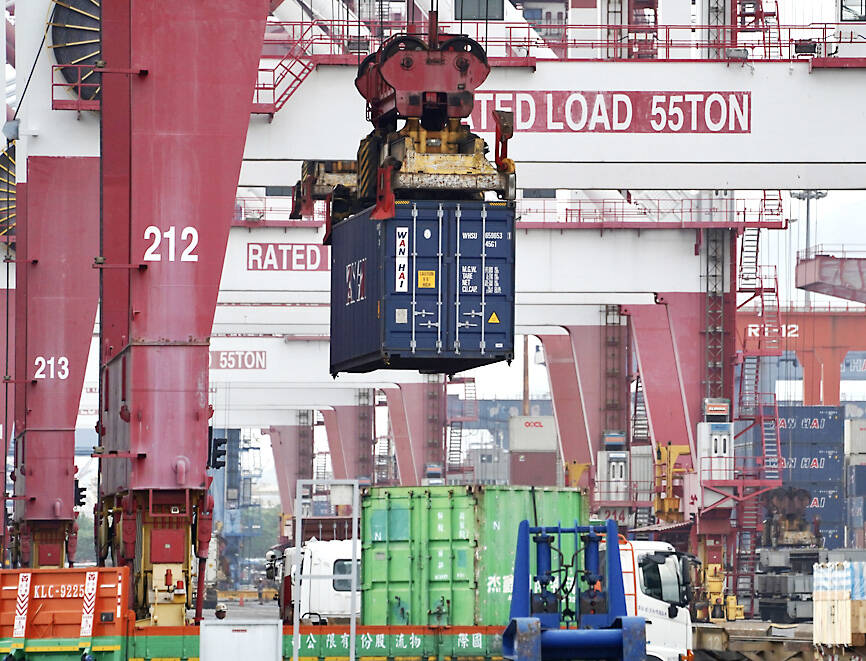Export orders fell at the slowest pace in about 10 months, at an annual rate of 12 percent, to US$47.73 billion last month, aided by major orders received by a local memorychip maker and a networking chip distributor as customers boosted global supply chain resilience, the Ministry of Economic Affairs said yesterday.
New orders for electronics and for information and communications technology (ICT) products last month beat the expectations of the ministry, Department of Statistics Director Huang Yu-ling (黃于玲) said via telephone.
Robust demand for artificial intelligence (AI)-enabled servers also helped buoy the weakness in outbound demand for Taiwanese goods, Huang said.

Photo: CNA
On a monthly basis, export orders expanded 8 percent from US$44.18 billion in June. During the first seven months of the year, export orders plummeted 27.9 percent year-on-year to US$316.3 billion as macroeconomic uncertainty dented demand.
With the electronics industry entering its peak season, the ministry expects export orders this month to drop 1.5 percent month-on-month to US$47 billion, or to grow 2.7 percent sequentially to US$49 billion. That represents an annual decline of 10.2 percent to 13.9 percent.
“For the third quarter, we expect the decline in export orders to be milder, helped by seasonal upticks and the introduction of new consumer electronics,” Huang said. “We also believe there is a chance to see export orders swing back to growth in the fourth quarter, thanks to the AI boom, improved supply chain inventory and a lower base.”
Overall, the ministry remains cautious about the lingering impact of high inflation and the central banks’ tight monetary policy on consumer spending behaviors, as well as a disappointing economic recovery in China, Huang said.
Orders for electronic products, primarily semiconductors, last month shrank 0.4 percent year-on-year to US$17.7 billion, on faltering demand for foundry services, chip testing and packaging services and printed circuit boards. Demand for memory chips and networking chips helped absorb some declines, the ministry said.
Orders for ICT products last month fell 14.9 percent year-on-year to US$12.73 billion, due to lower demand for notebook computers and networking devices. That was a monthly increase of 3.6 percent, aided by higher demand for AI servers.
Orders for optoelectronic products fell 4.6 percent year-on-year to US$1.65 billion because of flagging demand for camera lenses and backlight modules. Higher average selling prices of TV flat panels helped minimize the declines. On a monthly basis, orders expanded 2.2 percent.
Orders for base metals, mainly steel, slumped 19.4 percent year-on-year to US$2.07 billion, due to weak demand and lower average selling prices. That represented monthly growth of 1.2 percent.
Orders for machine tools plummeted 24.6 percent year-on-year to US$1.47 billion, or 9.2 percent month-on-month, as a weak global economy prevented businesses from investing in new equipment.
Order for plastics products sank 18.7 percent year-on-year, or up 1.6 percent month-on-month, to US$1.58 billion, while orders for petrochemical products plunged 25.4 percent year-on-year, or up 1.48 percent month-on-month, to US$1.48 billion, due to weak market demand and a supply glut.
Lower global crude oil prices also affected the outcome, with the average price falling by 25.3 percent year-on-year to US$81.06 per barrel.

Semiconductor business between Taiwan and the US is a “win-win” model for both sides given the high level of complementarity, the government said yesterday responding to tariff threats from US President Donald Trump. Home to the world’s largest contract chipmaker, Taiwan Semiconductor Manufacturing Co (TSMC, 台積電), Taiwan is a key link in the global technology supply chain for companies such as Apple Inc and Nvidia Corp. Trump said on Monday he plans to impose tariffs on imported chips, pharmaceuticals and steel in an effort to get the producers to make them in the US. “Taiwan and the US semiconductor and other technology industries

SMALL AND EFFICIENT: The Chinese AI app’s initial success has spurred worries in the US that its tech giants’ massive AI spending needs re-evaluation, a market strategist said Chinese artificial intelligence (AI) start-up DeepSeek’s (深度求索) eponymous AI assistant rocketed to the top of Apple Inc’s iPhone download charts, stirring doubts in Silicon Valley about the strength of the US’ technological dominance. The app’s underlying AI model is widely seen as competitive with OpenAI and Meta Platforms Inc’s latest. Its claim that it cost much less to train and develop triggered share moves across Asia’s supply chain. Chinese tech firms linked to DeepSeek, such as Iflytek Co (科大訊飛), surged yesterday, while chipmaking tool makers like Advantest Corp slumped on the potential threat to demand for Nvidia Corp’s AI accelerators. US stock

The US Federal Reserve is expected to announce a pause in rate cuts on Wednesday, as policymakers look to continue tackling inflation under close and vocal scrutiny from US President Donald Trump. The Fed cut its key lending rate by a full percentage point in the final four months of last year and indicated it would move more cautiously going forward amid an uptick in inflation away from its long-term target of 2 percent. “I think they will do nothing, and I think they should do nothing,” Federal Reserve Bank of St Louis former president Jim Bullard said. “I think the

SUBSIDIES: The nominee for commerce secretary indicated the Trump administration wants to put its stamp on the plan, but not unravel it entirely US President Donald Trump’s pick to lead the agency in charge of a US$52 billion semiconductor subsidy program declined to give it unqualified support, raising questions about the disbursement of funds to companies like Intel Corp and Taiwan Semiconductor Manufacturing Co (台積電). “I can’t say that I can honor something I haven’t read,” Howard Lutnick, Trump’s nominee for commerce secretary, said of the binding CHIPS and Science Act awards in a confirmation hearing on Wednesday. “To the extent monies have been disbursed, I would commit to rigorously enforcing documents that have been signed by those companies to make sure we get